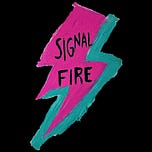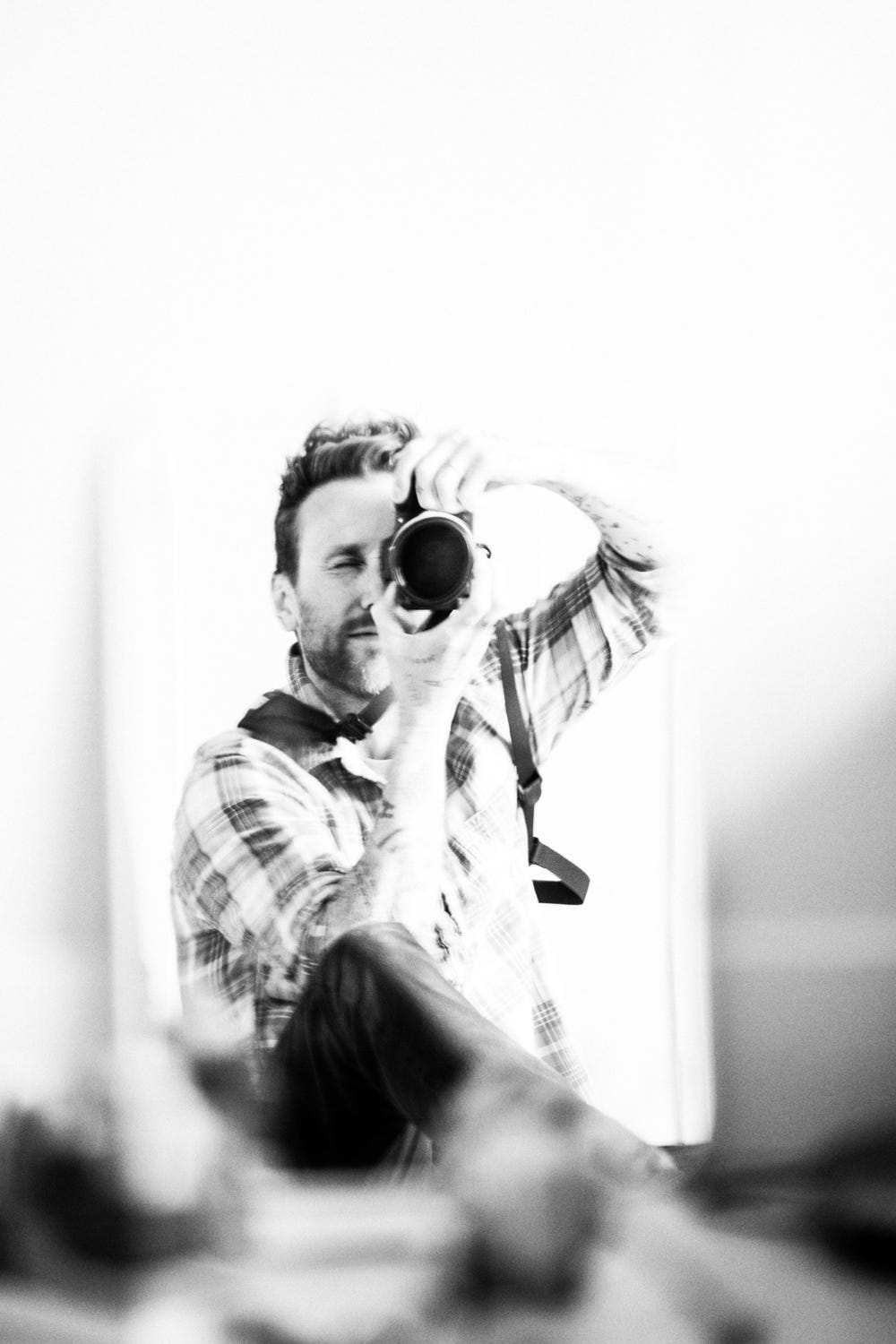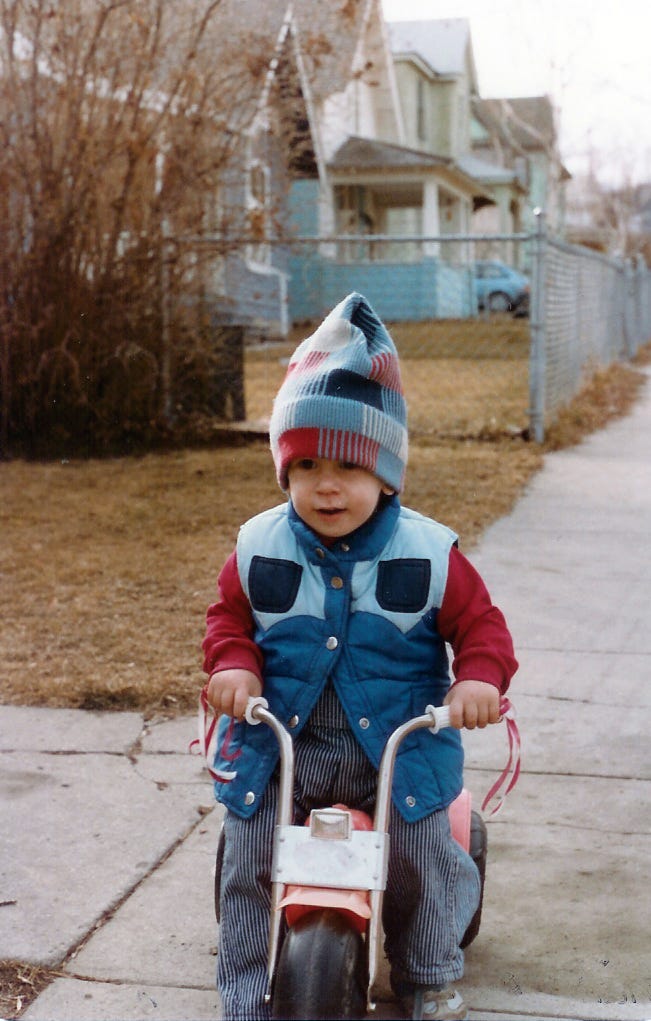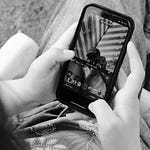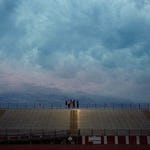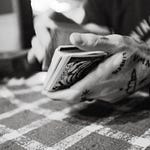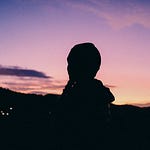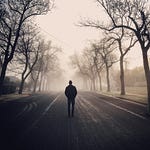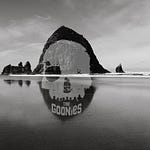If Autism was a high school Prom that required diagnosis to attend, you could say I showed up very, very late. I’d been at the venue all along, wandering around outside the party and listening to all the same music they were, only muted by the concrete walls of the gymnasium that held it. I saw the dancing lights filter out through the tall windows, I could imagine the weird rubber fabric floor protector over the basketball court, I could almost smell the sweat and Cool Water or CK One cologne wafting out. I was there, but I wasn’t inside.
I wasn’t officially diagnosed as Autistic until my late 30s, though a few people hinted, suggested, and truly knew all along. I think I knew too, but I was just so good at somehow seeming so Not Autistic on the outside. I didn’t know doing that had a name, I didn’t know just how talented we human beings are at simply getting by, at surviving, no matter the odds.
There’s a term for what Autistics do to survive, and it’s gotten a hell of a lot more popular over the last few years as the number of diagnoses have continued to rise. It’s called Masking, and here’s how the National Autistic Society in the U.K. defines it:
Masking is a strategy used by some autistic people, consciously or unconsciously, to appear non-autistic in order to blend in and be more accepted in society. Masking can happen in formal situations such as at school or work and in informal situations such as at home with family or socialising with friends.
Masking is sometimes referred to as ‘camouflaging’, ‘social camouflaging’, ‘compensatory strategies’ and ‘passing’. Research suggests autistic people learn how to mask by observing, analysing and mirroring the behaviours of others – in real life or on TV, in films, books, etc.
They add one line to their description of it that really stuck out to me, and in truth is what led to me wanting to write this essay in the first place. They said:
While this strategy can help them get by at school, work and in social situations, it can have a devastating impact on mental health, sense of self and access to an autism diagnosis.
A devastating impact on mental health, and access to an autism diagnosis. Ahh, thought myself when reading this, so THAT’S what happened.
Turns out, I learned to be me, this me that so many people would meet and spend time with and never truly know I was Autistic at all. This me that can look you in the eye, feels such deep empathy that I can feel what’s hurting in you without you saying it out loud, this me that can read minds if I allow the interior walls to fall for a few minutes, this me that struggles with more things than you’d ever realize.
In a million ways, I think I see myself now as a Steadi-Cam, one of those fancy gimbal systems that filmmakers and even TikTokers use to keep their camera or phone perfectly still and steady no matter what they are running, biking, skiing, skydiving, or jumping over. The chaos of their movement, swallowed by a fancy little shell that absorbs all the movement, that smooths it all out and sends back a calm, high definition, totally clear picture or video. Look at me from the outside, you’d never know the turbulence inside. Crack me open and dive in, you’d be tossed three thousand directions in a three thousandth of a second. Chaos within, calm on the surface.
I learned to be me.
Growing up in Montana in the 1980s and 1990s, Autism just wasn’t really a thing that people talked a lot about. Kids like me were just weird, or off, or got into trouble in school for racing through their homework and tests, being far too social in inappropriate times, lacking a filter, refusing to acknowledge authority, and being “too curious for his own good.” I knew, from the very beginning, that something about me was different, that I didn’t fit where the other kids fit, and it manifested in dozens upon dozens of little ways. I hated the field trip days every other kid looked so forward to, figuring out ways to get out of them every time I possibly could. I held thermometers to incandescent bulbs in the nurses office of my elementary school, but just long enough that my “fever” wouldn’t spike above 103°. I stole prescription pads from my doctor’s offices and used the side of a pencil to charcoal shade the indention of their signature in order to learn it, to copy it, to write myself notes to excuse myself from school without counting towards my dreaded Unexcused Absences.
I was accused of cheating, multiple times, for never bringing a pencil, a text book, a sheet of paper, but still getting A’s in my advanced level courses in high school. I was sent to the principals office more times than I can count for writing poetry instead of taking notes. My desk would be slid to the front of the room to touch the chalkboard anytime a substitute teacher filled in, taking the directive from a note left from the teacher.
All along the way, through all that struggle, I made jokes. I was the only Senior boy to even receive a vote for “Class Clown” when the annual Yearbook Senior Superlatives came out. A Monopoly of the Clown, I decided I’d name the memoir I’d never write one day. I made jokes, I chased girls, I kept eye contact when I thought I needed to, I had friends in every different social group. You’d have never guessed I was Autistic. Weird, sure, as what 16-year-old boy hung quotes from famous poets, philosophers, Buddha, and great thinkers on his walls instead of posters of sports heroes? What Montanan teenager wrote poetry all day and practiced Buddhism from age 12, despite being surrounded by Catholics and Christians? Never though, would you have guessed I was Autistic.
That was the gimbal, that was the Steadi-Cam in full-effect, and I was, I am, a master at it.
Just below the surface of those still, effortless, funny, calm waters, the hurricane was always raging. My stomach was sick, always, and was so much of the impetus to avoid the field trips, the early morning classes, the extra-curricular activities or being on a team. I had a dozen million different oddities that I’m sure people noticed, but only the tip of the iceberg. I wouldn’t eat at the classroom parties, never able to touch the food made by anyone else’s parents, in anyone else’s homes. I kept eye contact, sure, but no one could see the running count in my mind about how long I’d been doing so, making sure to never stay too long or else it’d be obvious. Find their eyes, two, three, four, five, look away, two, three, four, back to their eyes, two, three, four, five, raise your eyebrows a little, nod from time to time, pretend you don’t know exactly what they’ll say next, having long ago uncovered the hidden pattern to their story.
I wrote the poetry to stay afloat, in truth. I wrote because in poetry I could convince my spinning mind that I was somewhere else, that I wasn’t sitting in that fluorescently lit classroom where I could hear the electricity in the lights, and feel every degree of heat pumping from the archaic heaters by the windows. I wrote to get lost in my own world, rather than listen to the drone of the teacher teaching things I already knew, though I didn’t know how I knew. I wrote to live somewhere without rules, to disobey quietly, as I could not understand the why to all the because I was being fed by those in positions of any power. I wrote to mask, and I masked to make my passage easier, and I know this now.
Thing is, I didn’t mask for anyone else, and I know this too now. I masked for me. I masked because it was easier than explaining something I didn’t know had an explanation for, let alone a name. I masked because I learned to, because my silly mind did the calculus of social integration and determined the road would be so much less bumpy if I just did it any other way.
At the time, it all was normal to me, it was just how it was and how it’d always been and the exhaustion I felt, the absolute bone-weariness, was part and parcel with being me. The trips to the principals office were a price worth paying, the accusations when I couldn’t explain how I knew what I knew without paying attention in class, just part of the deal. I didn’t know then what I know now, that there was more help available, that there were names for the things I was experiencing, the things I was doing, the ways I was coping.
I know now I’m a “Bad Autistic” because I still, to this very day, don’t allow myself the ability to truly check out and not do the things that are hard. All I have learned, the hard way, has been so deeply ingrained into who I am that I think I still just “grin and bear it” and endure things I’ve no business enduring to help keep the status quo for those I love.
It’s those I Love that I think find it easiest to forget, as they spend the most time with me. So often I’m so “good” at seeming neurotypical, that when I have moments of true challenge with things, it can seem almost like a choice, almost like I’m being spoiled or difficult or overly-sensitive. It’s easy to forget the 10,000 radios I hear at all times when I walk outside the house, to forget the 2 weeks of planning my mind needs when I know we have to leave town, the internal meltdown when plans are suddenly changed, or bad weather makes the roads more hazardous after we’ve agreed to go somewhere. It’s easy to look at me, sitting and making jokes across the table from you, and not understand that I’m counting the seconds of our eye contact, that I’m hearing all the thoughts you’re not speaking aloud—the hidden fears, the things you’re not telling anyone, hell, the reasons you chose the color shirt you chose that morning.
Most don’t notice the temperature of the lights, or the loudness of someone’s chewing, or the sound of someone clinking their knife to their plate that makes my whole body feel like a seizure or a stroke is imminent. That everything, EVERYTHING, costs me the precious units of energy that I have to make sure last me from the moment I wake until the moment I close my eyes at night. That my battery depletes at a rate you’d never possibly believe, and I am literally kept upright by my own instinct for survival.
I’m bad at Autism because I don’t give in, not enough, not nearly enough. I don’t admit when I need to be carried, when I need darkness, or silence, or stillness, or space, or fresh air. I push on, and I push on, and I “go until I can’t go no more,” to quote Shoresy, and it’s then that I think those close enough can tell, can see the cracks in the mask I wear.
Headaches come first, when I hit this point. Crippling headaches that sideline me for sometimes up to 36 hours. They silence me, they steal the voice from my mouth and they force me from any light whatsoever, and they demand the quiet and the space that I’d been masking myself away from to that point. They force me to stop, to take it all off, to be alone in the darkness and to endure the pain as a consequence of all that stabilization.
I’m trying to be better about this, I’m trying my best, but I’d be lying if I said it was easy. I’m a step-dad to two teenagers, I’m a son to two parents that live in the same town, a brother to two sisters that live five hours away, a husband to the most amazing wife this world has ever known. I have things I just have to do, to be, to attend, to support. As deeply as I wish I could just play the Autism card more often, I don’t know how to, I don’t know how to let the ones I love down with the weight of any perceived inability. So I don’t. So I try, and try, and try again to be just be okay. To just have it be unnoticeable, to continue to put out perfectly still and smooth video, despite the moguls my poor mind skis over.
I do this because I learned to do this, because I don’t know another way.
I need to be better, I think, I just don’t know how. This essay, this shout into the void where I know so many beautiful people are listening, is just that, me telling myself by telling you, that we all need to be better. We have to draw boundaries to protect ourselves, sometimes from ourselves. We have to allow the strange idiosyncrasies that constitute our personalities the space, the respect, to BE those strange idiosyncrasies.
We have to take off the masks, and it’s something I am trying really hard to do. It’s such an odd thing, an unfiltered, unapologetic, unabashedly myself person, and I am realizing now, all these years later, that I’ve always had to wear these masks, not for anyone’s benefit but my own, to ease my own passage. Now, I am tired, and I want to take it all off and just BE how I cannot help but be.
I hope you, wherever you are, whomever you are reading this, take it as your cue to do the same. Whatever your “divergence,” wear it with pride and honor it and treat it with the respect you deserve. We are survivors, all of us, and sometimes, dammit, we just need a rest.
We just need a little darkness, a little quiet, a little peace, a little space.
We just need a rest.
If you enjoy this, please take two seconds to click the Heart to Like it at the bottom, and ReStack it or Share it. This really helps my work get seen by more people and helps this place grow.
The masks that I wear
are the masks that wear me down.
Trauma becomes strength.


